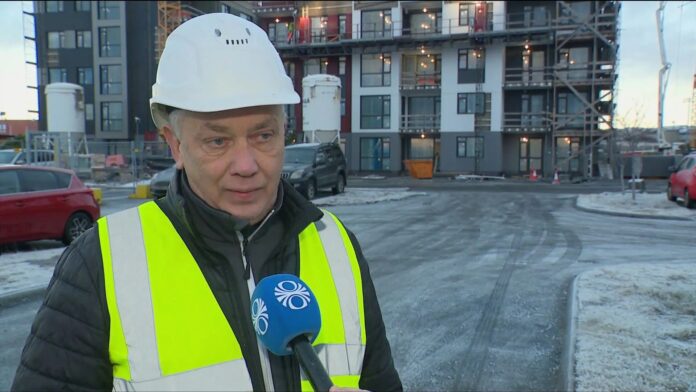Many smaller construction firms have had to carry out layoffs and abandon unfinished new-builds.
Uncertainty in the housing market has increased enormously recently after banks tightened their lending standards further following the Supreme Court ruling in the interest rate case. This is causing a downturn in the sector, and the consequences are already being felt.
“In the new-build market we are seeing a clear contraction. We are seeing companies that are significantly scaling down their activities, and some even closing. I see many smaller contractors who simply do not have the capital to continue, and who are frankly closing their building sites and laying off staff,” says Jón Bjarni Jónsson, chair of Byggiðn, the Icelandic union and professional association for construction workers.
He says it is sad that people feel they must choose this option, simply closing construction sites because of uncertainty about sales and financing. There is no obvious solution in sight that could be implemented immediately. The Central Bank’s guidelines on how much of disposable income may be used for housing purchases are also very unfavourable.
He welcomes the fact that alternative routes are emerging, such as several large developers now offering new financing options where a fund they control contributes up to 20% of the purchase price of the property. Pension funds could examine this as well.
I think these are reactions to the situation. People are trying to get these properties sold, trying to move them… I think this is a good contribution from those offering this, and I hope they do well.
The construction company Reir Verk was the first to offer the new financing model for purchasers of its properties through the fund Reir 20, in cooperation with Arion Bank. Under this arrangement, the company contributes up to 20% of the apartment price and thus becomes a 20% co-owner of the property.
Rannveig Eir Einarsdóttir, CEO of Reir Verk, says the model has been in development for quite some time before being offered in partnership with Stefnir, Arion Bank’s investment fund. Above all, they wanted to offer greater predictability for buyers and for themselves in the construction sector. The benefit to the buyer is considerable.
The buyer needs to bring far less equity. They contribute 10% [of the total cost] while the fund contributes 20%. So the buyer enters the housing market with an 80% share. [The mortgage loan is then for 70% of the total cost.] They own 80% of the property and can therefore leave the rental market, where more than 95% say they do not want to be. Rents are high and rising.
Thus the fund, as co-owner, will cover 20% of property charges and pay for its share of any works approved by the homeowners’ association.
And there’s another point. There is a lot of discussion about the quality of properties and new-builds today, and here the developer remains with you in the ownership. That is a kind of guarantee when it comes to quality and maintenance, because the fund intends to maintain its property.
The Financial Supervisory Authority is now considering whether part of such activity may fall under the housing loan legislation for consumers. Rannveig rejects the idea that this is a seller’s loan.
We are purchasers of the property alongside these co-purchasers, so we are co-owners… This is far from being a loan because we pay into the fund 20% of the property value, in the same way as the buyer pays 10%. And then there is a loan for the remaining 70%.
Source: Ruv.is




